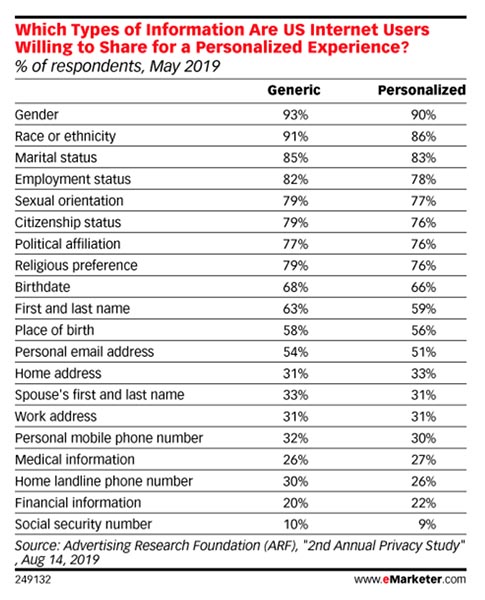Put on the brakes! In the past, surveys have shown that people are willing to provide their personal data in exchange for personalized experiences. However, new research from the Advertising Research Foundation (ARF) shows that this willingness is changing.
This data comes from “2nd Annual Privacy Study,” a survey of 1,100 US Internet users by the ARF and reported by eMarketer.
The study asked about 20 different categories of personal data, including gender and ethnicity, birthdate, religious preference, and spouse’s name. People were most likely to give out their gender to a website (93%) and least likely to give out their financial information, including Social Security numbers (20% and 10%, respectively). There were only three out of 20 cases (home address, medical information, and financial information) in which they were more likely to give the information in exchange for a personalized experience.

This is not to say that respondents’ lackluster for exchanging personal data for personalized experiences is particularly large. The differential ranged from 1% to 5%.
eMarketer reported that the willingness to make this exchange is also waning. The survey also found that, overall, people were slightly less likely to share their data in 2019 than they were one year ago.
For example, there was a 10-percentage point drop between those willing to share their home address this year (31%) and those who said they would do so last year (41%). The other biggest changes in whether respondents were willing to share their data between this year and last were seen in spouse’s first and last name (-8 percentage points), personal email address (-7 percentage points) and first and last names (-6 percentage points).
Furthermore, when respondents were asked which institutions they trusted, there was a slight drop, as well:
About a third (30%) of respondents said they trusted advertising last year and only 27% did this year; a third (33%) of people who said they use social media sometimes said they trusted it last year, and only 30% said they did this year.
To what can we account the change? According to eMarketer, it is consumers’ growing skepticism that they are actually getting anything in exchange for their data. In other words, they provided data in the past and, apparently, didn’t get enough value to make them feel that the compromising of their privacy was worth it.
This tells me that while brands may be collecting more data than ever, they aren’t making good use of it. Concern about invasion of privacy and data breaches is growing. If marketers are going to continue to get consumers to provide them with personal data, the perceived benefits of giving up that data have to grow, too—at minimum, enough to override the growing privacy concerns. Clearly, brands have some work to do.










Discussion
Join the discussion Sign In or Become a Member, doing so is simple and free